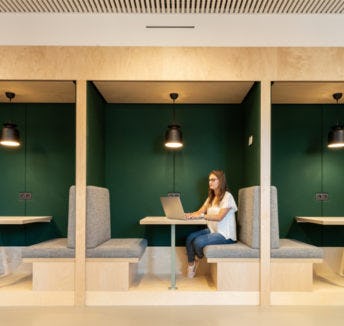
The holidays are behind us, January is in full swing, and the world has marched back to work weighed down with New Year resolutions. Fresh from signing up at the gym, stopping drinking (for this month at least) and deciding to eat more veg, Christmas seems like it never even happened. Of course, it’s good to have goals and a concrete plan in place for how to achieve them – but before we dive straight in, maybe it’s time to stop and reflect on the year just past. What went well? What did you achieve? What was the one thing you feel most proud of?
You may have heard a lot about the concept of “self-care” in 2019, and it’s one that Spaces wholeheartedly agrees with. Don’t worry, we’re not going to start chanting – but we do believe that it’s good to stand still sometimes and take a minute look at what you’ve achieved. Feeling thankful helps to keep you grounded, and to appreciate how the hard work you’ve put in has laid foundations for things to come. Whether it’s your personal or your work life, a gratitude journal can help you keep track of your achievements, put things in perspective, and give you a sound perspective from which to build for the following year.
If you’re still unsure which side of the hippy divide to come down on, don’t just take our word for it. No less a management oracle than the Harvard Business Review (HBR) is also a fan of writing things down as a way to build emotional resilience, and it’s got the stats to prove it works too. In an article on the findings of Dr Martin Seligman of the University of Pennsylvania, it found that, “When you commit positive interactions, events, and memories to the written word, they register higher value than other non-written forms of positivity currency-based activity”. And if that’s not enough to convince you to invest in a gratitude diary – or even download a free e-version – then you need to spend more time looking at cute-kitten memes.
Seriously, though, the fact is that showing gratitude works. So what’s the best way of going about it? The first step, according to the HBR, is to create a bull market. Just as financial markets ignite when an increasing number of investors show interest, gratefulness can become a self-perpetuating endeavour too. When we reflect on the positive aspects of our actions, that positivity spreads to those around us, which in turn makes them more positive. Some might call it karma but, whatever you want to label it as, the end result is the same: a positivity loop is created, and that loop works to make us feel more emotionally resilient and able to withstand the ups and downs of whatever comes our way.
A business that’s better able to withstand turbulent economic times is a business that builds resilience into its operating model by diversifying. And it’s the same with gratitude. According to “The Happiness Study” by Blackhawk Engagement Solutions, jobs only came in eighth out of 12 factors when responders were asked to rank what made them happy. What scored highly were things outside of the office, like community, family, friends, health and hobbies. But it still has resonance for work because all these things contribute to a sense of wellbeing that, in turn, makes us happier – and more productive – there. So spending time reflecting on the things you were really grateful for last year, and investing in those things, is likely to bring dividends both personally and professionally.
Since we’ve been quoting the HBR here, let’s stick with the business terminology. The final step is all about reporting regularly. It’s important to keep track of your data points in a business environment and – you’ve guessed it – this idea can also be applied to the business of gratitude. Looking back on the year allows you to identify how you’ve achieved success, and what to do more and less of to keep that trend going. You might even want to consider carrying the gratitude review on throughout the year, and even taking a few moments at the end of each day to record all the good things that happened. (You’ll find it works far better than staring at a to-do list of all the things that didn’t.)
So, 2020 is here and with it a whole host of new challenges, changes, and opportunities. We wouldn’t have it any other way. Before we get going, let’s appreciate everything that happened last year and what it all means going forward. Whether it’s in the small wins, big victories or simply something that we’re grateful for, like the barista who gave us the free coffee, taking a moment to think can really help to get some much-needed focus for the upcoming year – and create a positivity loop that will make the next 12 months even better than the last.
At Spaces, we’re all about appreciating the little things in life. Like the importance of a good meeting room, no matter the size. Check out what we can do for you right here.
Share this article
 Read now Business in Brussels? Setting up an office in the capital of Europe has never been easier.
Read now Business in Brussels? Setting up an office in the capital of Europe has never been easier.
 Read now Calling all Spaces members: Tell us what flexible working means for you in 2020.
Read now Calling all Spaces members: Tell us what flexible working means for you in 2020.